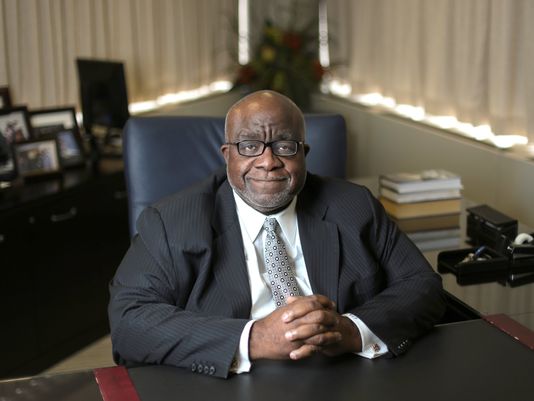
Wayne County Community College District (WCCCD) as an institution cannot say it, but Chancellor Dr. Curtis L. Ivery can. And he hopes voters vote yes on a millage that would ensure better lives for WCCCD students and the community it serves.
The college is seeking voter approval November 6 to combine and continue two prior voter-approved millages otherwise set to expire in 2020 and 2022. A favorable vote would not increase the rate currently paid by property owners in the rate taxed of about $2.25 per $1,000 of taxable rate. A yes vote simply ensures that WCCCD continues as the vital anchor it is now.
“This is certainly a very important moment for this city, for this region, and for this country,” Dr. Ivery said during the Chancellor’s Community Update Luncheon at WCCCD’s downtown campus. “Historically, our institutions are not protected, and we need this millage to pass in order to keep WCCCD going strong. I’ve fought for education all my life and we have to continue to fight for our kids. Every day I get up excited to make a difference.”
WCCCD was established in 1967 and opened its doors for the first time in 1969. It was founded during a time when cities across the nation were experiencing protests and civil uprisings, including Detroit. The infamous Detroit 1967 riot was one of the most violent urban revolts in the 20th century. Following Detroit’s own experience, Detroit leaders sought to create new opportunities for residents, including higher education. In those first decades, though, there was a revolving door of chancellors and little stability.
Since Chancellor Ivery took over WCCCD in 1995, it has grown to become the largest urban community college district in Michigan and one of the largest and most respected urban community college districts in the nation. WCCCD grew from serving 7,000 students nearly 25 years ago, to serving nearly 70,000 annually. It has six campuses, covering some 36 cities and townships, and 500 square miles. Its students are diverse, speaking some 50 different languages and coming from every walk of life.
WCCCD’s financial management has become a national model among community colleges for squeezing every penny out of a dollar in a history of consistently balanced budgets, resulting in the highest national bond ratings.
“We approach our mission to create pathways to better lives for all of our students with the seriousness and intentionality that it deserves, said Chancellor Ivery. “Ensuring we have a strong financial foundation with which to operate is vital to that mission.”
This funding will allow WCCCD to keep developing and providing new programs to meet the current and future requirements of good and sustainable jobs. It also supports maintaining and growing the capital improvements needed at each of its campuses to make sure WCCCD students are ready for the best jobs.
The two millages being combined are for $1.25 million, expiring in 2020 and one millage expiring in 2022. An earlier millage of $1 million was reduced by the Headlee Amendment. The combined amounts will total $3.24 million with passage of the ballot issue.
The vote for combining and continuing prior voter-approved millages will ensure that WCCCD continues empowering the people, families, neighborhoods and communities we serve so that learning truly does lead to a better life.
District Dean for International Programs for WCCCD David C. Butty told the story of a village hunter who killed an elephant and wanted to keep the prize for himself, until a village priest and the resident carriers convinced him that he could not carry the prize on his own. More can be accomplished for the community as a whole if everyone worked together.
“You may not be from my village, but education is everybody’s business,” said Butty. “By voting yes on this millage, we can carry this elephant into the village and we will all enjoy it.”
The college is a regional leader in workforce training and development. WCCCD works with area businesses, city, county, and state government leadership, and other agencies and groups to ensure that southeast Michigan has the skilled workforce it needs to fill high-demand positions and boost area economies. WCCCD alumni add some $284 million in income to the region every year.
WCCCD is also building a $25 million health and wellness center at its downtown campus called City Center. The project will add an 80,000-square-foot building at Fort and Fifth streets that will offer training for students in fields such as biotechnology, hydroponics, fitness training, athletics, sports management and more. The center is scheduled for a spring 2019 completion.
Every capital improvement project WCCCD has completed in the last 25 years has come in on time and under budget.
“We have always worked to provide pathways to better lives for our students and the construction of this site allows us to add tremendous value to the region in addition to training students who both want and need to excel in their careers,” said Chancellor Ivery. “City Center will also provide a home for the college’s Wildcat basketball team along with other athletic activities and entertainment events.”